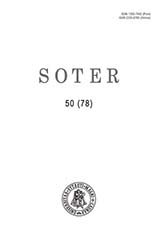Gydytojų profesinės etikos standartai teismų praktikos požiūriu
Professional ethics standards of physicians in case law
Author(s): Jonas Juškevičius, Mindaugas VerbickasSubject(s): Christian Theology and Religion
Published by: Vytauto Didžiojo Universitetas
Keywords: Gydytojų profesinės etikos standartai; Teismų praktika; Gydytojo atsakomybė pacientų teisės; Ethical standards of medical profession; Case law; Physician’s liability; Patient rights
Summary/Abstract: Gydytojo profesijos visuminis pobūdis gali būti apibūdintas visų pirma kaip misija ar pašaukimas pagelbėti pacientui sunkiomis jam egzistencinėmis aplinkybėmis. Dėl šios priežasties gydytojo veiklai keliami aukšti etiniai standartai, kuriuos laikui bėgant suformulavo pati medikų profesinė bendruomenė. Profesinių standartų vaidmuo pripažįstamas ir teisėje, todėl nenuostabu, kad teismai, vertindami gydytojų atsakomybę dėl netinkamai suteiktų sveikatos priežiūros paslaugų, atsižvelgia ir į profesinių standartų laikymąsi teikiant šias paslaugas. Straipsnis nagrinėja Lietuvos teismų praktikos požiūrį į gydytojų profesinės etikos reikšmę atsakomybės atvejais. The peculiarity of medical profession lies in the fact that in their professional practice health care providers are directly and intimately related to the patient, and the service provided is primarily focused on the wellbeing of the human person. That is, patient’s physical and mental health, or even life depends on physician’s actions. Therefore, the patient, due to his sensitive existential situation, always expects not only professional evidencebased service but also diligence, prudence and compassion. For that reason the medical profession is not just a source of physician’s income which is regulated by legal provisions on provided services or employment relations. Medical professional principles are somewhat radically contrary to the ones of professions based on economic benefit. However, the universal character of the medical profession can be more accurately described by terms “mission” or “vocation”. Early historical sources of medical ethics emphasized very close relation between health care business and moral attitudes of the physician. For example, the most influential is the Hippocratic Oath which formulated fundamental ethical principles for the physician and eventually became generally accepted standard of medical practice. The importance of moral requirements for medical profession is recognised in the law: eg. Article 4 of the European Convention on Human Rights and Biomedicine states that “[a]ny intervention in the health field, including research, must be carried out in accordance with relevant professional obligations and standards.” Lithuanian legislation also points out the role of the professional standards: eg. the Article 6:38 of Lithuanian Civil Code provides that if the execution of the obligation involves professional activity, then it must follow the standards applied for that particular professional activity. The article therefore analyses whether the said legal provisions on the role of professional medical ethics are implemented in court practice, since the Supreme Court of Lithuania only relatively recently established some criteria that should be followed when testing whether a physician fulfilled his duties properly to a patient. The Court stressed that such a test should include a compliance with the provisions of medical professional ethics.
Journal: SOTER: religijos mokslo žurnalas
- Issue Year: 78/2014
- Issue No: 50
- Page Range: 65-80
- Page Count: 16
- Language: Lithuanian

